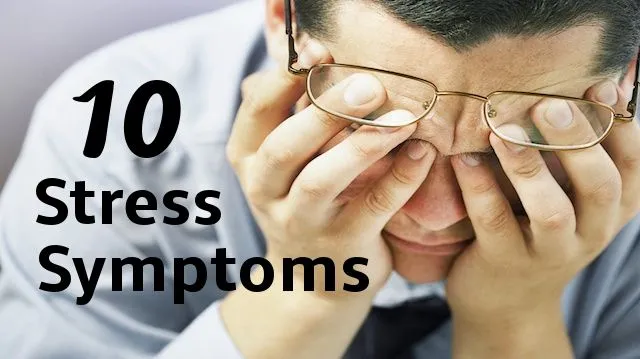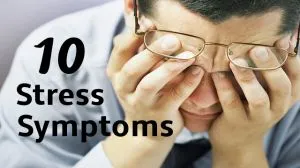
- Share on Facebook414
- Share on Pinterest
- Share on Twitter
If you’re experiencing any of the following 10 symptoms, it may be time to consider whether underlying or overt stressor(s) are taking a toll on your health.
Jaw and Neck Pain
When some people are under stress, they tend to clench or even grind teeth together—an action called bruxism. This can occur unconsciously during the day or as you sleep at night. Constantly doing this can lead to problems with the temporomandibular joint (TMJ)—your “jaw joint,” and severe jaw and neck pain.
Dental Problems
Bruxism does not only lead to jaw and neck pain, but can also cause serious wear and tear on your teeth, tooth pain, and in severe cases, tooth loss.
Skin Problems
Besides increasing inflammation in the body, stress can also make the skin more sensitive to irritants. Thus stress can worsen or trigger a bout of conditions like acne, rosacea, and psoriasis, as well as dehydrate the skin and make it more sensitive in general.
Sexual Dysfunction
We often think of this symptom as a natural sign of aging, or the result of a big change in hormones, but stress is often a common cause of sexual dysfunction in men and women. Specifically, stress is often the culprit for a loss of sexual desire.
Hair Loss
Losing around 100 strands of hair per day is normal, but if you find that you’re losing more than this or more than is normal for you, you might want to examine your stress levels. Stress-induced hair loss, called telogen effluvium, can cause a person to lose up to three-quaters of their hair. The loss often occurs weeks or months after the stressful event.
Gut Problems
Stress can also wreak havoc on your gut, causing or exacerbating issues such as stomach aches, ulcers, diarrhea, IBS, constipation, and changes in the microbiome—or gut bacteria.
Twitches and Tremors
Experiencing a new or strange tic or twitch on your body, or are your hands suddenly shakier than usual? The cause may be stress. According to calmclinic.com, “Stress puts a great deal of tension on your muscles and your nerves. Under that level of tension, your muscles experience a rush of hormones and unusual blood flow. Sometimes referred to as ‘benign fasciculation syndrome,’ the muscles are simply reacting to changes in nerve energy, pressure, and body disrupted body signals.”
Muscle Aches and Pains
When you’re stressed, your body and brain are in an almost constant state of fight-or-flight mode. Being constantly “on guard” requires your muscles to always be tight and tense in preparation for action. Eventually, that perpetual tension may lead to chronic and painful knots and aches.
Dry Mouth Although health professionals aren’t 100% sure why stress can cause feelings of having a “dry mouth,” they think it may be because people tend to breathe more through the mouth when stressed, and the fact that stress can also cause a change in the way fluids circulate in the body. Either way, this is a common and irritating symptom of stress and anxiety.
Although health professionals aren’t 100% sure why stress can cause feelings of having a “dry mouth,” they think it may be because people tend to breathe more through the mouth when stressed, and the fact that stress can also cause a change in the way fluids circulate in the body. Either way, this is a common and irritating symptom of stress and anxiety.
Although most of these symptoms can be caused by a number of other health issues, if you’re experiencing one or more of them, stress levels are definitely something to consider.
It’s true that many of these problems can seem serious, but the good news is that reducing your stress levels, along with improving your response to stressful situations, can lead to a lessening of these symptoms as well as an improvement in the way your body feels and your overall health (and life!).
Good stress relieving methods to consider include meditation, yoga, deep breathing, and journaling. Making more general lifestyle changes including getting more sleep, eating a healthy diet, and exercising have also been shown to do wonders for stress levels.
-The Alternative Daily
Sources:
http://chriskresser.com/how-stress-wreaks-havoc-on-your-gut
http://www.calmclinic.com/anxiety/signs/muscle-twitching
http://www.calmclinic.com/anxiety/symptoms/dry-mouth
http://www.everydayhealth.com/anxiety-pictures/scary-symptoms-of-stress-0118.aspx#06
- Share on Facebook414
- Share on Pinterest
- Share on Twitter

